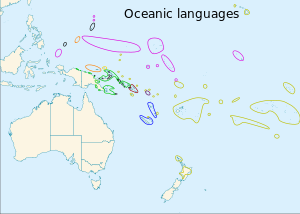The Southern Oceanic languages are a linkage (rather than family) of Oceanic languages spoken in Vanuatu and New Caledonia. It was proposed by John Lynch in 1995 and supported by later studies. It appears to be a linkage rather than a language family with a clearly defined internal nested structure.
| Southern Oceanic | |
|---|---|
| Geographic distribution | Vanuatu, New Caledonia |
| Linguistic classification | Austronesian
|
| Proto-language | Proto-Southern Oceanic |
| Subdivisions | |
| Language codes | |
| Glottolog | None |
 Southern Oceanic | |
Classification
editClark (2009) groups the North Vanuatu and Central Vanuatu languages together into a North-Central Vanuatu (NCV) group and also reconstructs Proto-North-Central Vanuatu,[1] but this is not accepted by Lynch (2018).[2]
In addition to the Temotu languages and the Northwest Solomonic languages of the western Solomon Islands, Geraghty (2017) notes that many Southern Oceanic languages are often lexically and typologically aberrant, likely with Papuan substrata - particularly the Espiritu Santo, Malakula, South Vanuatu, and New Caledonian languages, and perhaps also some Central Vanuatu languages of Ambrym and Efate.[3]: 823–826 Nevertheless, languages in the eastern Solomon Islands, including Guadalcanal, Malaita, Makira, and a scattering of North Vanuatu languages including Mota, Raga, and Tamambo, are much more conservative.
Languages
editFollowing Clark (2009) and Glottolog 4.0, three major groups can be delineated, which are North-Central Vanuatu, South Vanuatu, and New Caledonian. The first group is a linkage, while the others form genetic subgroups.[1][4]
Lynch (1995)
editLynch (1995) tentatively grouped the languages as follows:[5]
- Banks–Torres family
- Northwest Santo family
- Southwest Santo family
- Sakao
- East Santo family
- Ambae–Maewo family
- Nuclear Southern Oceanic linkage
- Central Vanuatu linkage
- Epi–Efate
- South Efate – Southern Melanesian linkage
- South Efate dialect network
- Southern Melanesian family
- Southern Vanuatu family
- New Caledonian family
The non-nuclear branches are subsumed under Northern Vanuatu.
Ross, Pawley, & Osmond (2016)
editRoss, Pawley, & Osmond (2016) propose the following internal classification for Southern Oceanic.[6]: 10
- Southern Oceanic linkage
- North Vanuatu linkage
- Nuclear Southern Oceanic linkage
See also
editNotes and references
editReferences
edit- ^ a b Clark, Ross (2009). Leo Tuai: A comparative lexical study of North and Central Vanuatu languages. Canberra: Pacific Linguistics. doi:10.15144/PL-603. ISSN 1448-8310.
- ^ Lynch, John (2018). "Final Consonants and the Status of Proto-North-Central Vanuatu". Journal of the Linguistic Society of Papua New Guinea. 36. ISSN 0023-1959.
- ^ Geraghty, Paul (2017). "Languages of Eastern Melanesia". In Hickey, Raymond (ed.). The Cambridge Handbook of Areal Linguistics. Cambridge: Cambridge University Press. pp. 821–851. doi:10.1017/9781107279872.030. ISBN 9781107279872.
- ^ Hammarström, Harald; Forkel, Robert; Haspelmath, Martin, eds. (2019). "Glottolog". 4.0. Jena: Max Planck Institute for the Science of Human History.
- ^ Lynch, Ross, & Crowley (2002:112)
- ^ Ross, Malcolm; Pawley, Andrew; Osmond, Meredith (eds). The lexicon of Proto Oceanic: The culture and environment of ancestral Oceanic society. Volume 5: People: body and mind. 2016. Asia-Pacific Linguistics (A-PL) 28.
Bibliography
edit- Clark, Ross (2009). Leo Tuai: A comparative lexical study of North and Central Vanuatu languages. Canberra: Pacific Linguistics. doi:10.15144/PL-603. ISSN 1448-8310.
- François, Alexandre; Franjieh, Michael; Lacrampe, Sébastien; Schnell, Stefan (2015), "The exceptional linguistic density of Vanuatu" (PDF), in François, Alexandre; Lacrampe, Sébastien; Franjieh, Michael; Schnell, Stefan (eds.), The Languages of Vanuatu: Unity and Diversity, Studies in the Languages of Island Melanesia, Canberra: Asia Pacific Linguistics Open Access, pp. 1–21, ISBN 9781922185235
- Lynch, John, and Terry Crowley. 2001. Languages of Vanuatu: A New Survey and Bibliography. (Pacific Linguistics, 517.) Canberra: Research School of Pacific and Asian Studies, Australian National University.
- Lynch, John, Malcolm Ross & Terry Crowley. 2002. The Oceanic languages. Richmond, Surrey: Curzon Press.